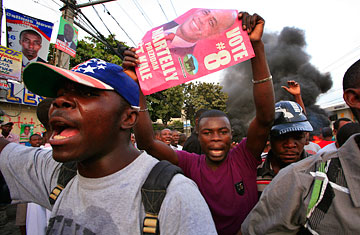
A Haitian holds a poster of presidential candidate Michel Martelly during a protest in Port-au-Prince on December 8, 2010
The longstanding credibility issues of Haiti's Provisional Electoral Council (CEP) continued on Tuesday, when it announced preliminary election results that gave second place — and a place on a runoff ballot on January 16 — to President Rene Preval's hand-picked candidate, Jude Celestin. International observer groups maintain that Celestin had, in fact, finished third behind opposition candidate Michel "Sweet Micky" Martelly. After an election marred by widespread reports of fraud, many Haitians took to the streets to make it clear whom they were believing, and it wasn't the CEP.
The resulting wrath, especially among Martelly supporters, led to gunfire and left the streets of Port-au-Prince choked by' roadblocks and burning tires on Wednesday, while the headquarters of the ruling INITE (Unity) Party was set on fire. Preval, widely criticized for his aloof response to January's massive earthquake that killed 230,000 people, called for calm; but the unrest shut down the capital's airport. With more than a million Haitians still homeless after the quake, and with a cholera epidemic so far claiming 2,100 more lives, the nation is in no mood to tolerate what many suspect is government-engineered fraud. "All the money Celestin spent on his campaign, he could have [bought us new homes]," says protester Dadil Jean-Pierre, 21. "INITE has been in power for too long, and they haven't done anything for us with their power."
According to the CEP, opposition candidate Mirlande Manigat, a 70-year-old constitutional law professor and former First Lady, finished first with 31% of the vote, followed by engineer Celestin, 48, with 22.5% and Martelly, 49, with 21.8%. That razor-thin margin, representing fewer than 7,000 votes, has provoked widespread skepticism, since independent organizations such as the European Union-financed National Election Observation Council (CNO), which placed more than 5,500 monitors at 15% of Haiti's polling stations, estimated that Martelly won closer to 25% and Celestin about 20%.
Even the U.S., which contributed $14 million to the election effort, says it's worried that the CEP's results are "inconsistent" with those of credible international watchdogs, and urged that the results reflect "the will of the people". And while the Organization of American States (OAS) and the Caribbean Community (Caricom), which jointly monitored the election, said they considered the vote valid, they warned that the CEP results "are preliminary and therefore not the final word on the outcome of the first round," which are scheduled to be released on Dec. 20.
Since none of the 19 candidates won a 50%-plus-one majority in the first round on Nov. 28, a runoff between Manigat and the No. 2 candidate, either Celestin or Martelly, will be staged in the New Year. But on Wednesday, Port-au-Prince was awash with rumors that because of the controversy, the CEP may now call for a three-candidate runoff — something Martelly and his backers rejected as a ploy to keep Celestin's candidacy alive in spite of the international observers' reports. The CEP would not comment; but its director, Pierre-Louis Opont, conceded that the government will have to be more vigilant against "irregularities" during the runoff. (The runoff issue is a sensitive one in Haiti, since election officials refused to hold a second round in the last presidential election, in 2006, even though Preval did not really win a first-round majority.)
Many Haitians were already upset with the CEP for disqualifying popular Haitian-American hip-hop singer and philanthropist Wyclef Jean from the presidential race last summer, insisting he hadn't met residency requirements although he's a Haitian citizen. Martelly, himself a former pop music star and a Wyclef friend, encouraged his supporters in a radio address to protest peacefully against the alleged fraud. "The international community says it's our right," he insisted. But many of the protests have turned violent. Gunshots were heard echoing throughout the capital Tuesday night, though no deaths were reported.
Jean Francois Vezina, a police spokesman for the U.N. Stabilization Mission in Haiti (MINUSTAH), acknowledges that protests are erupting all over the country and are growing in scale. But he says most demonstrators have been relatively benign. "The protests are not really violent," Vezina told TIME. "Some protesters throw stones or block the roads with cars or burning tires. But the security situation can change rapidly here." There were unconfirmed reports of two protest-related deaths in the southwestern city of Les Cayes, where government buildings had been attacked and set ablaze. Businesses and schools in Port-au-Prince, meanwhile, remained closed.
Not surprisingly, given earthquake recovery and cholera vigilance, only about 1 million of Haiti's 4.7 million registered voters turned out to vote — and those who did often couldn't find the right polling station to cast their ballots. Still, the election is a crucial one for Haiti, since its next leader will oversee some $10 billion in earthquake recovery funds from the U.S. and international donor community.
